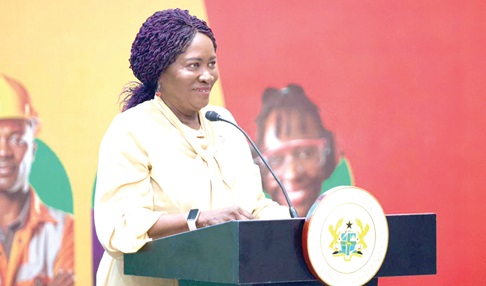
Ten thousand young Ghanaians have been admitted into the maiden cohort of the Adwumawura Programme, a government initiative that seeks to address youth unemployment through entrepreneurship and innovation.
The programme, a flagship project under the National Entrepreneurship and Innovation Programme (NEIP) and operating within the newly established Ministry of Youth Development and Empowerment, is designed to assist Ghanaians aged 18 to 35 with technical, vocational and entrepreneurial skills to start and expand their businesses.
Launched in April this year, the Adwumawura Programme is backed by GH¢110 million in funding from the 2025 National Budget through the Ministry of Finance.
Beneficiaries will receive practical training in business planning, financial management, digital skills, customer service and sustainability strategies.
The package also includes mentorship, start-up kits and access to markets and networks to transform business ideas into viable, scalable enterprises.
The programme attracted more than 120,000 applications through both online and manual channels.
From this pool, 10,000 beneficiaries were selected from every constituency, district and region to ensure nationwide inclusivity.
The matriculation and onboarding ceremony for the 2025 cohort was attended by several high-profile dignitaries, including the Vice-President, Prof. Naana Jane Opoku-Agyemang; staff from her office; the Minister of Food and Agriculture, Eric Opoku; the Minister of Youth Development and Empowerment, George Opare-Addo; the Member of Parliament for Ayawaso West Wuogon and Deputy Minister of Food and Agriculture, John Dumelo; the Pro-Vice-Chancellor of the University of Ghana, Prof. Felix Ankomah Asante; the Chief Executive Officer (CEO) of the NEIP, Eric Adjei; the MP for Ablekuma North, Ewurabena Aubynn and the Country Director of the British Council, Nii Doodo Doodo.
Opportunities
Addressing the event in Accra yesterday, the Vice-President charged the youth to seize opportunities provided by the Adwumawura Programme.

She encouraged the beneficiaries to embrace discipline, honesty and to focus, reminding them that the journey ahead would not be without challenges.
She urged the cohort to stay resilient and committed, saying: “No business, no matter how successful, is free from setbacks; what will set you apart is how you rise above them and continue to innovate regardless”.
Prof. Opoku-Agyemang described the programme as a national movement to drive innovation, create jobs and transform the economy.
The Vice-President stated the programme was proof of the government’s dedication to investing in young people as Ghana’s most valuable resource.
“The true wealth of our country lies beyond our natural resources and resides in the creativity, energy and determination of our people, especially the youth,” she said.
“The 10,000 beneficiaries we celebrate today are not here by chance. They represent the determination, ambition and readiness needed to drive change in our country,” she added.
She lauded the trainers and development partners, adding that their role extended beyond facilitation to mentoring the next generation of ethical and innovative entrepreneurs.
Mr Opare-Addo praised President John Dramani Mahama for his “unwavering dedication” to the cause of young people.
He said the President had established a ministry solely dedicated to youth development and backed it with consistent funding for flagship programmes that directly impacted young people.
He said, “the government is committed to establishing 10,000 young entrepreneurs annually. Over four years, we hope to support at least 40,000 young people to start and grow their businesses”.
The Minister of Youth Development and Empowerment urged the government to increase the budgetary allocation to the programme, adding that the GH¢100 million invested this year had been impactful, but more resources would help to expand its reach.
MOU
The Minister of Food and Agriculture disclosed that the ministry had signed a Memorandum of Understanding (MoU) with the NEIP to support entrepreneurs, especially poultry farmers, under the Nkoko Nketenkete Initiative.
He said beneficiaries would have access to chicks, feed, battery cages and extension services to strengthen their operations.
He encouraged the youth to take advantage of the initiative, saying: “You are encouraged to explore modern methods of farming, mechanisation, innovative processing techniques, digital applications and market-oriented strategies to improve productivity”.



